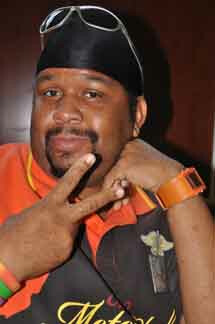
Retreat offers respite from challenges of HIV/AIDS
 BY MELISSA LAUBER
BY MELISSA LAUBER
UMCONNECTION STAFF
Living with HIV/AIDS can be "a fulltime thing," every hour, every day, 365 days a year. "It shapes you and not always in the best ways," said participants at the Quality of Life Retreat June 10 at Camp Manidokan near Harper's Ferry.
But at the retreat, sponsored by the Baltimore-Washington Conference Quality of Life Committee, the 37 participants said they "found a chance to take a breath," to remember some of the best things about themselves, and to seek and revel in "Inner Peace," the theme of the three-day event.
"I am living proof that miracles happen. All of us here are." said Natasha, who likes to think of herself as "a work in progress."
At the retreat, members shed the masks and bravado they sometimes adopt in their daily lives. Authenticity, vulnerability and honesty are hallmarks of the time spent together.
"We are definitely not the Waltons here," said one participant who, like many others present, said periods of their lives were spent overindulging in indiscriminate sex and drug abuse. "I was diagnosed HIV positive in 1985 and told I had two years to live," he said. "The party started in 1985 and didn't end until 2010, when I was arrested and went into court-ordered treatment."
He attended the retreat last year, "clean just a short while," and the pent-up anger began to leave him. "Slowly but surely at that retreat, it started oozing out. Now I'm working on trying to become more spiritual, loving and creative."
Some of those present, like Algern who "has 23 years sobriety," offered hard-earned wisdom. "I'm just beginning to learn if you don't pick it up, you don't have to let it go," he said. "Don't pick something up it you don't want to deal with it. Let it be that simple."
But for Pastor Nancy Green of Pleasant Walk UMC in Frederick County, who helped lead the retreat, things at the Quality of Life retreat are never "simple." The complexities of these people's lives, many of whom struggle with poverty and other challenges, fills her heart.
Green began volunteering at the retreats 12 years ago, when Sylvia Burtner asked her to help with arts and crafts. She enjoyed helping people make cards and other items for their prayer partners.
Each retreat has a slightly different character -- most include a sometimes raucous no-talent talent show; meaningful, and often tear-filled worship; and frank conversation. The summer retreats are held at Manidokan and the winter retreats are at Washington Retreat House in D.C.
But for Green, each retreat, she said, "continues to teach me how incredible God is." She offers a Christian presence to the community, reaching out with words of healing, challenge and affirmation.
"God says, 'Go and love in my name.' That is what we do here," she said.
The Rev. Reg. Barss of Magothy UMC in Pasadena also helps lead the retreat. When he celebrates Communion, Barss is aware that it is not always liturgically orthodox, but it is important to him, he said, that the ritual be meaningful to those who come to the Table.
One year, Barrs used a Communion chalice from Zimbabwe to remind people that AIDS is a global epidemic.
In the past 30 years, the National Institutes of Health reports, there have been 60 million HIV infections throughout the world, with at least 30 million deaths. In 2009, 2.6 million people became infected with HIV and 1.8 million died. More than 90 percent of these cases occurred in the developing world, two-thirds in sub-Saharan Africa.
The city of Washington, D.C. shares these epidemic rates, the district HIV/AIDS Administration said in a June 15 report. More than 3 percent of D.C. residents older than 12 are living with HIV or AIDS. The District's HIV prevalence rate of 3.2 percent is the highest for any U.S. city.
Baltimore also struggles with HIV/AIDS. Recent reports show that the rate of new diagnosis is nearly three time the nation's, the Baltimore Sun reports. In the Zip Code 21217, along the Sandtown-Winchester and Pennsylvania Avenue Corridor, the percentage of people living with HIV/AIDS is 15 times the national average.
The church must offer a witness to these people, Green said. One of its best responses is the Quality of Life retreats.
Since they began in 1988, there have been 89 retreats, serving more than 3,400 people living with HIV/AIDS.
"Us who are infected and us who are affected find something here," said Steven. "Too often we give up and don't recognize the miracle is right here, within us. What you put in is what you'll get out. You just keep pressing on."
of Life retreat.

Login/Register to leave comment